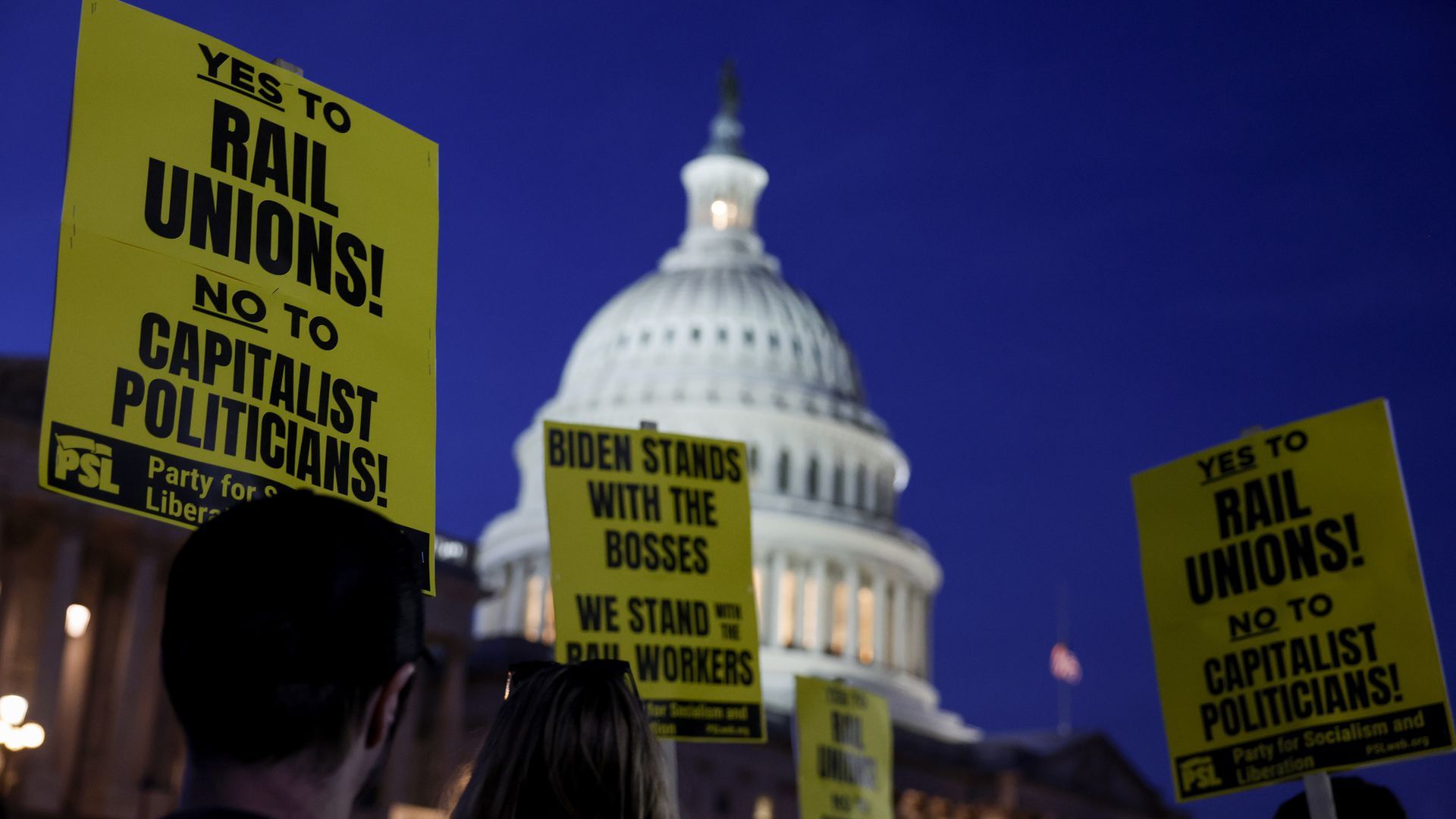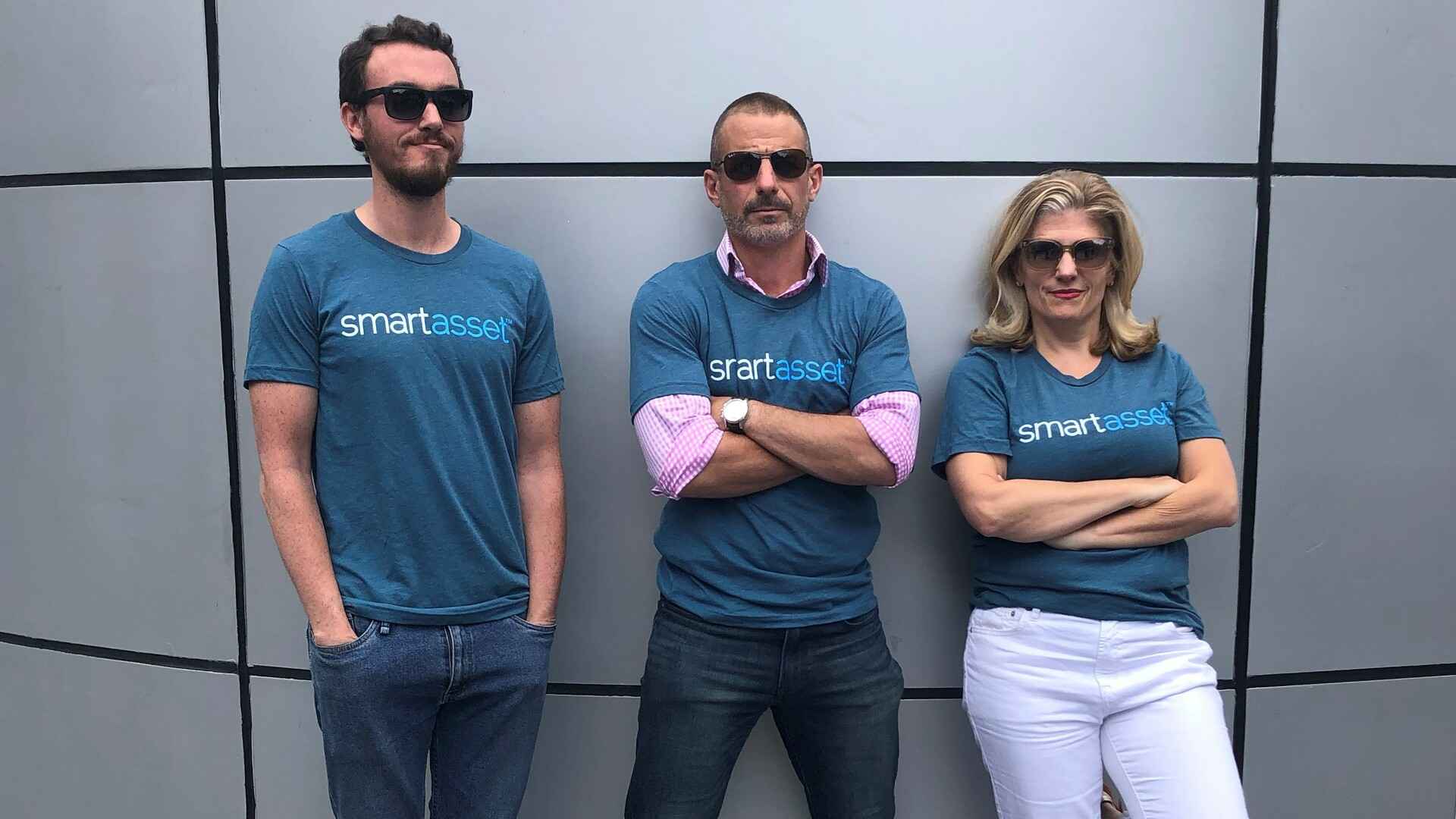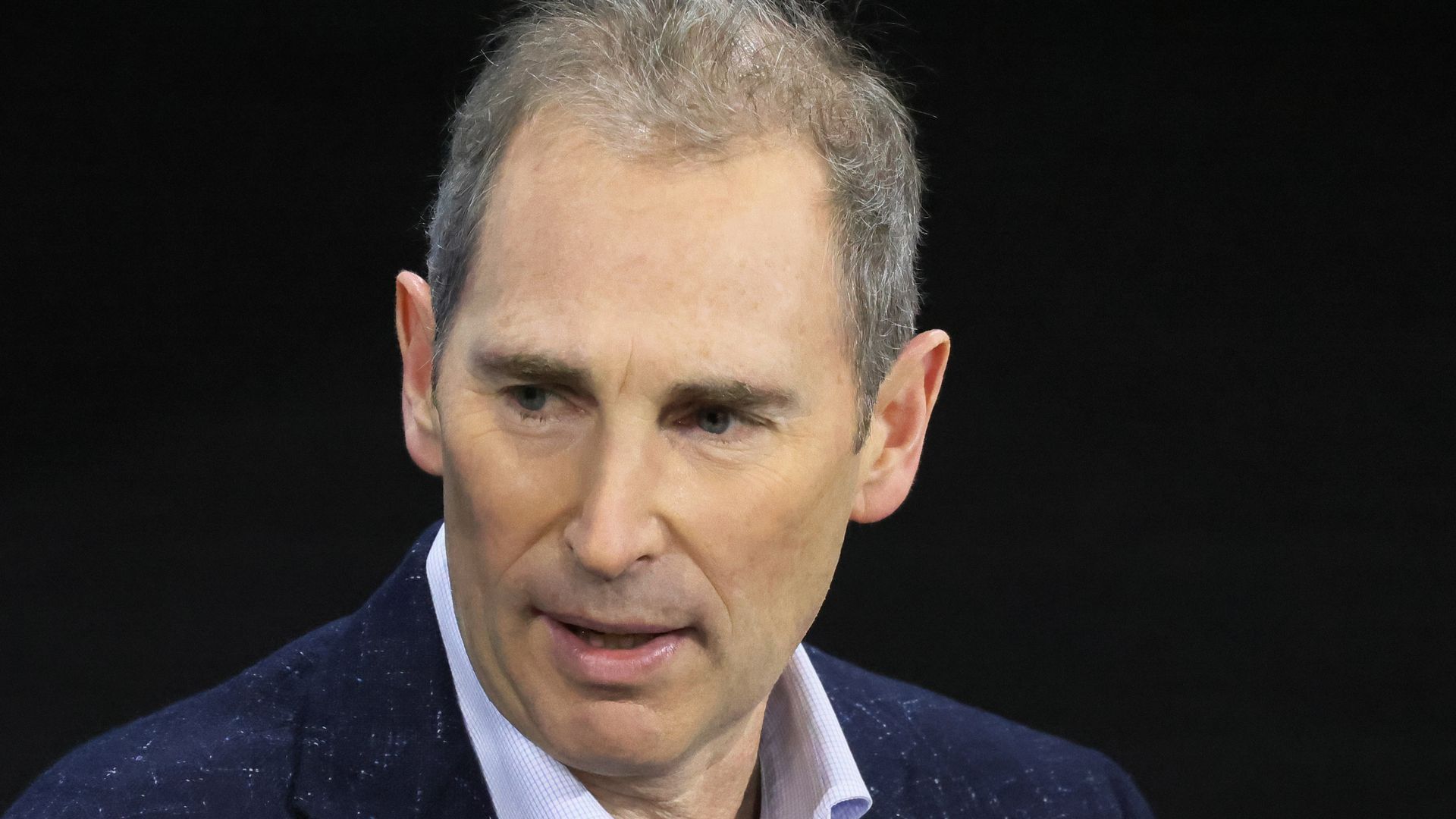| | | | | | | Presented By SmartAsset | | | | Axios Markets | | By Emily Peck and Matt Phillips · Dec 01, 2022 | | Happy December! It's Emily. Today we're going deep on union fights and vibes from the Fed. 🤨 Meanwhile, I'm wondering: Do you folks play pickleball? Today I learned that the sport has grown so popular that real estate agents use it to sell houses: The number of for-sale listings that mention pickleball rose 86% over the last year, per WSJ. 🎦 Sam Bankman-Fried continued his post-collapse media tour yesterday. (Watch) Today's newsletter is 1,107 words, 4.5 minutes. | | | | | | 1 big thing: Strike averted, almost definitely |  | | | Activists in support of unionized rail workers protest outside the U.S. Capitol on Tuesday. Photo: Anna Moneymaker/Getty Images | | | | A railroad worker strike likely won't happen now that Congress has stepped in, Emily writes. - But a key sticking point in the standoff — whether the more than 100,000 freight rail workers get any paid sick leave — is still an open question.
The big picture: The rail workers' battle is emblematic of some of the most critical worker issues of the post-pandemic era — revolving not around money, per se, but worker leverage, quality of life and paid sick leave. - The high-stakes negotiation process was also a test of the Biden administration's pro-labor resolve, with some workers and organizers expressing disillusionment with the president.
What's happening: On Wednesday, the House voted 290-137 to force railroad workers to agree to the labor deal reached back in September at the White House, and now that bill is headed to the Senate where there appears to be bipartisan support. (With some uncertainty.) - Senate Majority Leader Chuck Schumer (D-N.Y.) said Tuesday that both he and Senate Minority Leader Mitch McConnell (R-Ky.) "agreed we'd try to get it done ASAP."
- "The Senate must now act urgently," Biden said yesterday.
The intrigue: The House also voted 221-207 to give rail workers seven days of paid sick leave, in a separate bill. The deal brokered by the administration didn't include any. Some rail workers had voted down the deal over the issue. - Progressive lawmakers are trying to push this provision through, but it's a long shot in the Senate.
- Meanwhile, some workers say they feel betrayed by a president they thought was on their side.
Yes, but: Without Biden's intervention, it's likely that the parties would still be at the bargaining table, says Greg Regan, president of the AFL-CIO's Transportation Trades Department, which represents 37 unions across the transportation industry including all the rail workers. As for the deal's failure to provide sick leave, Regan blames the rail companies. - "We're going to have to continue to put pressure on railroads to reform," he says. "People are now very aware of the conditions these workers are dealing with and how vital they are to the economy. They can't just go back to being forgotten."
Read more |     | | | | | | 2. Catch up quick | | 🐦 EU and U.S. turn up the heat on Elon Musk over Twitter. (FT) 🇫🇷 Biden hosts Macron amid friction over U.S. climate law. (AP) |     | | | | | | 3. It's all relative |  Data: FactSet; Chart: Axios Visuals Fed chair Jerome Powell rolled out a fairly hawkish speech Wednesday, and the markets … rallied? What happened: Powell spoke at 1:30 pm at the Brookings Institution, his last public appearance before the FOMC policy meeting in two weeks, Axios' Kate Marino writes. - He said there's been no "clear progress" toward lower inflation just yet — and that rates may ultimately peak even higher than he thought just a few months ago.
- But in the last paragraph of his prepared remarks, he said the Fed could shrink the size of its rate hikes as soon as its December meeting.
The impact: Markets shot up — the S&P by over 3% and the Nasdaq composite by 4.4%. Between the lines: Despite Powell's insistence that we haven't seen much progress in the inflation fight, that December comment made waves. - "The signal that the Fed is going to slow down in December was unambiguous," wrote Krishna Guha of Evercore ISI in a research note.
💭 Our thought bubble, via Neil Irwin: This was not a more fundamentally dovish message than the November FOMC press conference. - Yes, but: Coming amid the loosening in financial conditions that followed the October CPI release, anything short of the tone of his August Jackson Hole speech — in which he called for more "economic pain" in the fight against inflation — gave investors reason to head back into risk-on mode.
|     | | | | | | A message from SmartAsset | | This billion-dollar startup wants to help you retire | | |  | | | | This Princeton grad's startup raised $161 million to help people plan for retirement. With 110 million Americans over the age of 50, it's no wonder people are taking notice. SmartAsset's free, five-minute tool makes it easy to find vetted financial advisors who serve your area. Learn more. | | | | | | 4. Jassy is still not a fan of unions |  | | | Andy Jassy speaking at the Dealbook Summit Wednesday. Photo: Michael M. Santiago/Getty Images | | | | Amazon CEO Andy Jassy yesterday appeared to double down on comments about the pitfalls of unionizing that got him into a clash with the National Labor Relations Board earlier this year, Emily writes. Why it matters: The labor board under Biden has been remarkably pro-union, but the dust-up with Jassy over these comments tests the limits of the power it can wield over businesses, experts told Axios. - Jassy's comments are kind of "egging on the board," says James Cooney, a labor professor at Rutgers.
- But ultimately the kinds of penalties the NLRB can dish out are "notoriously lame," he adds.
What happened: In an interview with Andrew Ross Sorkin at the New York Times DealBook Summit, Jassy said workers at his company are better off without a union. - "It's nice to be able to have a direct relationship with your manager," he said, implying that unionized workers wouldn't have that — but noting that the choice is theirs to make.
- "We like to hear from all our employees as opposed to having a filter through one or two voices," he said, adding that with a union "you often end up with an 'us versus them' mentality."
Flashback: Jassy made essentially the same remarks in an interview with Sorkin on "Squawk Box" in April. - The comments triggered a complaint from the Amazon Labor Union filed at the NLRB, saying they violated federal labor law because they are coercive and interfered with the organizing process.
- "It's a threat," says Seth Goldstein, a partner at Julien, Mirer & Singla, who represents the Amazon union. Jassy is essentially saying that if you unionize you'll lose direct access to your boss, which isn't the case, he tells Axios.
- Goldstein said in a tweet yesterday that he would file another complaint over Jassy's latest comments.
- Earlier this month, Amazon responded to the complaint saying that it was "without merit," that Jassy was within his rights to speak freely and that the labor board's complaint violates the First Amendment.
- Yesterday, Jassy acknowledged the kerfuffle, telling Sorkin that he thought his comments were "fairly non-controversial and straightforward."
What they're saying: The law generally allows CEOs to speak freely unless they're threatening or coercing employees over unionization. - This complaint over comments in public — not at mandatory company meetings — is more of an edge case, says Cooney, who also worked for the labor board decades ago.
- The charges are just "the latest salvo" in the NLRB's "concerted attack on employer free speech," Glenn Spencer, a senior vice president of the Chamber of Commerce, said in a post on Oct. 28.
What's next: If the NLRB were to prevail here, it would issue a cease-and-desist order that Jassy not repeat comments like this. - Just last week, in a separate labor case, a court issued an order like that — telling the company it can't fire workers for unionizing.
Go deeper: Labor board blasts Amazon's "flagrant" attempt to flout court order |     | | | | | | A message from SmartAsset | | 7 mistakes to avoid when hiring a financial advisor | | |  | | | | Working with a financial advisor can be a crucial part of any healthy retirement plan, so hiring the wrong one could wreak havoc on your investments. There are 7 common mistakes people make when hiring an advisor, including: - Not hiring a vetted advisor.
- Hiring your first find.
See the other 5 | | | | 1 thing Emily LIKES: Wordle, the daily word game. And, as it turns out, so do a lot of our readers. - Many of you wrote in to say the puzzle words should stay random and not be themed, as the solutions were over Thanksgiving weekend.
- That's what makes the game fun, Sandy in Fargo writes in an email. "Remove that, and it becomes just another skill game, with the accompanying angst if you miss," she wrote us. "[W]hen it ain't BROKE, don't UNFIX it."
- Personally, I'm fine either way — the mystery of whether the word is random or themed keeps me on my toes.
Thanks to all who wrote in. Please keep the emails coming! We love to hear from you. Tell your friends and colleagues to sign up for Axios Markets here! Today's newsletter was edited by Kate Marino and copy edited by Mickey Meece. |  | | Why stop here? Let's go Pro. | | | | | | Axios thanks our partners for supporting our newsletters. If you're interested in advertising, learn more here.
Sponsorship has no influence on editorial content. Axios, 3100 Clarendon Blvd, Arlington VA 22201 | | | You received this email because you signed up for newsletters from Axios.
Change your preferences or unsubscribe here. | | | Was this email forwarded to you?
Sign up now to get Axios in your inbox. | | | | Follow Axios on social media:    | | | | | |








No comments:
Post a Comment